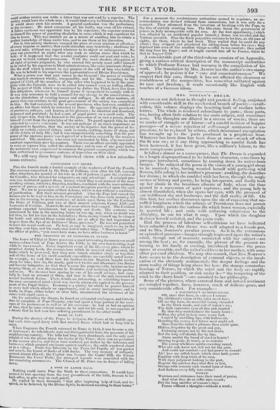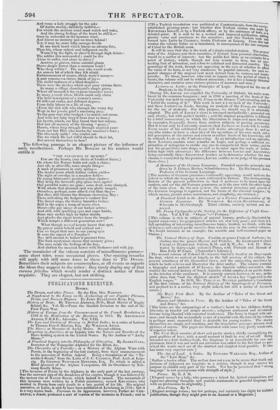MRS. NORTON'S DREAM.
A untoutut not deficient in thought and poetical feeling, conjoined with considerable skill in the mechanical branch of' poetry—versifi- cation, this volume displays the besetting fault of modern belles lettres. The whole is rendered subordinate to parts ; those parts, too, having often little relation to the main subject, and sometimes none. The thoughts are diluted in a stream of words ; there are no marks of struggle or of labour—of a careful revision of happier passages—of a severe rejection of well-enough sentiments or ex- pressions, to be replaced by others, which determined excogitation has wrought up to the parts produced in a propitious hour. Whatever has been done has been done at once—struck off when the fit was on ; or any thing approaching to careful finish has been bestowed, it has been given, like a milliner's labour, to the more conspicuous parts.
It follows almost as a consequence, that The Dream is expanded to a length disproportioned to its intrinsic character, sometimes by passages introduced, sometimes by running down its native-born images. The subject of the poem is the vision of a young girl about to be married ; who, having wearied herself with gathering wild flowers, falls asleep in her mother's presence : awaking, she describes her dream ; in which she rambled with her lover, through the magic scenes of history and poetry, he being interpreter, and finally took up her abode in the luxurious climate of Italy, where the time passed in a succession of quiet raptures ; and the young lady is almost dissatisfied, when she opens her eyes, with the prospect of our indifferent sky and landscape, and the dull reality of life. On this hint, her mother discourses upon the sin of expecting that un- ruffled happiness which the scheme of Providence does not permit in this world ; paints the various ills which beset woman, especially in in:wiled life ; and ends with enforcing submission to the Almighty, be our lot what it may. Upon which the daughter declares herself satisfied, and the poem ends.
had the process of laborious self-criticism we have indicated been submitted to, this theme was well adapted to a female pen, and to Mrs. NoRTON'S peculiar powers. As it is, the extraneous or episodical passages—images strongly impressed upon the writer's mind, though not of necessity connected with her subject—are among the best ; as, for example, the picture of' the peasant re- turning to his family at evening, intsoduced because the poem. opens at eventide, mid the writer's address to her mother, with some other personal allusions. We may also remark, that Mrs. NORTON'S forte seems to be the description of external objects, or the incul- cation of' the obviously sentimental; the deeper feelings and the stern reality of things being above her ken : the strange counterba- lancings of Nature, by which the mind and the body are rapidly adapted to their position, or sink under it—" the tempering of' the wind to the shorn lamb "—are unsuited to her philosophy.
Some of the pictures, where external form and inward sentiment are mingled together, have, however, much of delicate grace, and very considerable effect. For example—
A DAUGHTER'S REMINISCENCES.
Oft, since that hour, in sadness I retrace Afy childhood's vision of thy calm sweet face; Olt see thy form, its mournful beauty shrouded ln thy black weeds, and coif of widow's wo; Thy dark expressive eyes all dim and clouded By that deep wretchedness the lonely know : Stifling thy grief, to hear some weary task Coined by unwilling lips, with listless air, Hoarding thy means, lest future need might ask More than the widow's pittance then could spare. Hidden, forgotten by the great and gay, Enduring sorrow, not by fits and starts, But the long self-denial, day by day, Alone amidst thy brood of careless hearts!
Striving to guide, to teach, or to restrain The young rebellious spirits crowding round, Who saw not, knew not, felt not for thy pain, And could not comtbrt—yet had power to wound!
Alt! how my selfish heart, which since bath grown
Familiar with deep trials of its own, With riper judgment looking to the past, Regrets the careless days that flew so fast, Stamps with remorse each wasted hour of time, And darkens every fully into crime!
WOMAN.
Warriors and statesmen have their meed of praise,
And what they do or suffer men record; But the long sacrifice of woman's days
Passes without a thought—without a word;
And many a holy struggle for the sake Of duties sternly, faithfully fulfilrd,— For which the anxious mind must watch and wake, And the strong feelings of the heart be stilrd,— Goes by unheeded as the summer wind, And leaves no memory and no trace behind! Yet, it may he, more lofty courage dwells In one meek heart which braves an adverse fate, Than his, whose ardent soul indignant swells Warm'd by the fight, or cheer'd through high debate:
The soldier dies surrounded ; could he /ire
Alone to suffer, and alone to strive ?
Answer, ye graves, whose suicidal gloom Shows deeper horror than a common tomb ! Who sleep within ? The men who would evade An unseen lot of which they felt afraid.
Embarrassment of means, which work'd annoy— A past remorse—a future blank of joy— The sinful rashness of a blind despair—
These were the strokes which sent your victims there. In many a village churchyard's simple grave, Where all monark'd the cypress-branches wave; In many avnult where Death could only claim The brief inscription of a woman's name ; Of different ranks, and different degrees, From daily labour to a life of ease, (From the rich wife who through the weary day Wept in her jewels, grief's unceasing prey, To the poor soul who trudged o'er marsh and moor, And with her baby begg'd from door to door,) Lie hearts, which, ere they found that last release, had lost all memory of the blessing " peace ;" Hearts, whose long struggle through unpitied years
None Saw but Him who marks the mourner's team;
The obscurely noble! who evaded not The wo which He had will'd should be their lot, But nerved themselves to bear !
The following passage is an elegant picture of' the influence of early recollections. Perhaps Mr. Roonns or his readers would entitle it
"Tun PLEASURES or MEMORY."
Few arc the hearts, (nor theirs of kindliest frame,)
On whom fair Nature holds not such a claim;
And oft, in after-life, some simple thing— A bank of primroses in early spring— The tender scent which hidden violets yield—
The sight of cowslips in a meadow-field-
Or young laburnum's pendant yellow chain—
May bring the favourite play-place back again! Our youthful mates are gone ; some dead, some changed,
With whom that pleasant spot was gladly ranged; Ourselves, perhaps, more alter'd e'en than they— But there still blooms the blossom-showering May ;
There still along the hedgerow's verdant line
The linnet sings, the thorny brambles twine; Still in the copse a troop of merry elves
Shout—the gay image of our former selves ; And still, with sparkling eyes and eager hands, Some rosy urchin high on tiptoe stands,
And plucks the ripest berries from the bough—
Which tempts a different generation now: What though no real beauty haunt that spot, By graver minds beheld and net iced not ; Can we forget that once to our young eyes It wore the aspect of a Paradise?
No; still around its hnllow'd precinct lives
The flind mysterious charm that memory gives ; The man reeds the feelings of the boy,
And clothes the meanest flower with freshness and with joy.
The remainder of the volume consists of miscellaneous poems—
some short tales, some occasional pieces. Our opening remarks will apply with still more three to these than to The Dream. Sometimes their subjects are commonplace, at all events as regards the ideas they suggest to the writer : they rarely display any of that otriosa felicita$ which would render a distinct notice of them requisite. They are elegant, but not striking.



























 Previous page
Previous page